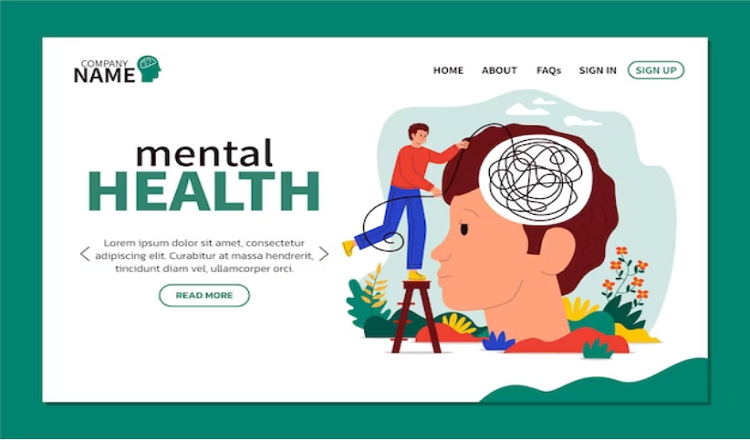
With good cause, the subject of mental health has received a lot of attention lately. It is used to describe a person’s entire psychological health, which includes their capacity for emotional, cognitive, and social functioning. Neglecting mental health can have serious repercussions because it is crucial to total wellness.
Concern should be expressed over the current situation of mental health in the USA. Nearly one in five American individuals (19.1%), according to the National Institute of Mental Health, suffer from a mental disorder each year. This figure emphasizes the necessity to give mental health a high priority in our culture, both for the sake of individual well-being and for the benefit of our community as a whole.
Despite the fact that more individuals are becoming aware of the significance of mental health, many still find it difficult to put their own mental health first. When we are occupied with work, family, and other duties, it can be simple to miss the symptoms of poor mental health. It is never too late to start making healthy changes, but taking care of our mental health is crucial for preserving total wellness. In this blog, we’ll look at the role that mental health plays in overall wellness and talk about how to get better mental health in the USA. So let’s get started and make putting our mental health first!
Describe mental health.
The term “mental health” refers to a person’s emotional, psychological, and social well-being and is important for total wellness. We can manage life’s daily challenges, form healthy relationships, and make wise decisions that result in fulfilling lives when we are in good mental health. Self-worth, resiliency, coping mechanisms, and a sense of direction are essential components of good mental health. When these factors are in harmony, people are better able to handle life’s problems, feel more upbeat, and experience more well-being.
Our ability to work, sustain relationships, and maintain our physical health are all impacted by our mental health. Chronic stress, physical sickness, and a decreased quality of life are all consequences of poor mental health. We can increase our overall wellness and enjoy happier, more fulfilled lives by putting our mental health first. It’s critical to keep in mind that mental health is a dynamic process that calls for care and attention rather than being in a fixed condition. We can increase our well-being and our capacity to deal with life’s ups and downs by establishing excellent mental health habits.
American prevalence of mental health problems
In the USA, millions of people experience some sort of mental disease each year, making mental health issues widespread. The National Institute of Mental Health estimates that in 2019, there were 51.5 million American adults (20.6%) who had a mental illness. Depression, bipolar disorder, schizophrenia, and anxiety disorders are the most prevalent mental health conditions in the USA.
Stress, trauma, heredity, and environmental variables are a few of the factors causing an increase in mental health problems in the USA. The COVID-19 epidemic has recently had a substantial influence on mental health, aggravating pre-existing conditions and bringing on new ones. The stigma associated with mental illness might deter people from seeking treatment, which increases the frequency of mental health problems. In order to decrease the prevalence of mental illness and provide support for those who are struggling, it is crucial to address these causes and raise knowledge about mental health.
The Effect of Mental Health on Wellness as a Whole
A person’s physical health, social interactions, and work productivity are all significantly impacted by their mental health, which is a crucial aspect of total wellness. People who have poor mental health are more prone to develop physical conditions including diabetes, heart disease, and chronic pain. Social interactions can be negatively impacted by poor mental health, which can result in isolation, strained relationships, and a reduction in social support.
At the office, poor mental health can result in lower output, absenteeism, and higher medical expenses. Financial hardships, job loss, and a lower quality of life are further consequences of mental health concerns. Therefore, it is essential to give mental health top priority and get help when required. By addressing mental health issues, people can live happier, healthier lives and improve their physical health, interpersonal connections, and productivity at work.
Techniques for Preserving Mental Health
There are many methods people can employ to encourage excellent mental health because it is essential for total wellness to maintain good mental health. In order to maintain excellent mental health, it is important to prioritize one’s own needs and partake in relaxing and well-being-enhancing activities. Exercise, meditation, a balanced diet, and adequate rest are a few examples of this.
Time management, setting limits, and practising relaxation methods like yoga or deep breathing are all tactics for managing stress, which is also crucial for sustaining good mental health. Importantly, a vital part of preserving healthy mental health is asking for assistance when necessary. This may entail contacting a mental health expert or asking for help from family and friends. People can maintain their mental health and improve their general well-being by using these techniques.
The stigma associated with mental illness
Those who have mental health concerns may be greatly impacted by the stigma around mental health. It may result in emotions of guilt, loneliness, and a resistance to getting help. As a result of stigma, people with mental illnesses may face discrimination and have less access to resources and support.
Promoting education and awareness about mental illness and its prevalence is crucial for eradicating the stigma associated with mental disease. Sharing personal experiences, promoting legislative change, and combating stigmatizing language and attitudes can all be part of this. It’s also essential to foster a friendly environment for people struggling with mental health concerns. This may entail showing compassion, listening without passing judgment, and facilitating access to tools and resources. We can build a more welcoming and supportive community that values the wellbeing of all of its members by battling mental health stigma.
Conclusion
In conclusion, putting mental health first is crucial for leading a fulfilled life. Mental health is an important part of overall wellness. In the USA, mental health problems are common, and they can have a negative impact on one’s physical health, social relationships, and employment productivity. Self-care, stress reduction, and getting help when necessary are methods for preserving healthy mental health.
However, stigma surrounding mental illness can discourage people from getting treatment and feed myths about it, resulting in prejudice and restricted access to resources and support. It is crucial to spread knowledge about mental health, raise awareness of it, and foster an environment that is supportive of those who are struggling with mental health concerns.
By promoting legislative reform, granting access to mental health resources, and combating mental health stigma, society can make mental health a priority. In the USA, we can strengthen our communities and improve people’s well-being by focusing on mental health. It’s time to give mental health top priority and to build a culture where mental health is respected.
Read More You May Like:








